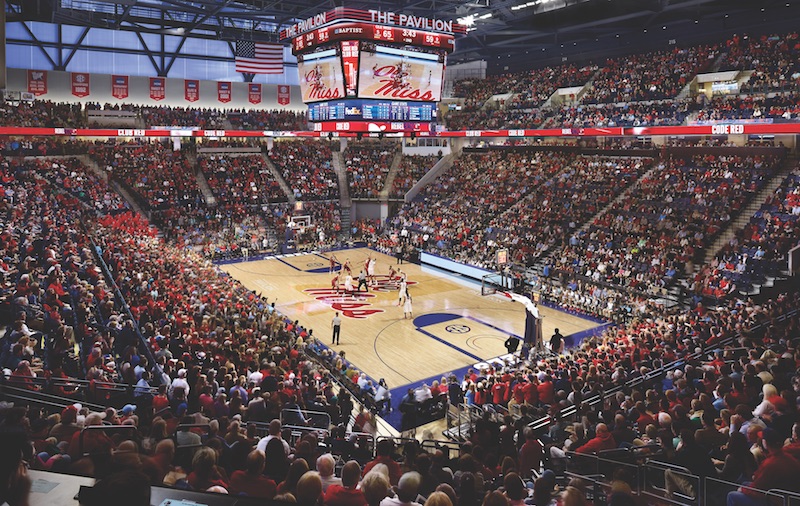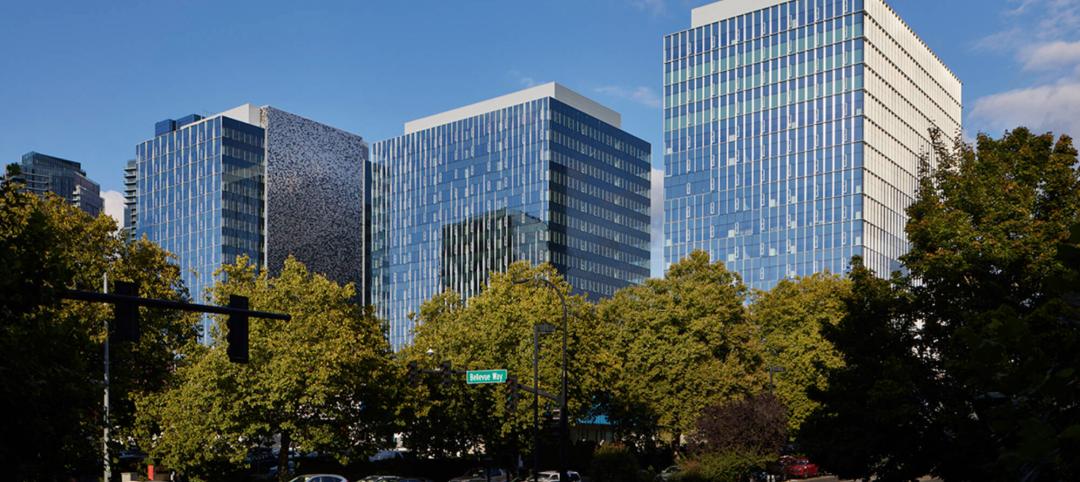The University of Nebraska Omaha’s hockey program has experienced modest success since its establishment in 1997, but last year marked the Crimson and Black’s first brush with the elite. The Mavericks reached the 2015 NCAA Frozen Four, the semifinal round of the NCAA Men’s Division I Ice Hockey Tournament.
TOP 50 SPORTS FACILITY ARCHITECTURE FIRMS
Rank, Firm, 2015 Revenue
1. Populous $113,741,160
2. HKS $81,220,737
3. HOK $58,589,000
4. Gensler $42,850,000
5. HNTB Corporation $13,419,171
6. Cuningham Group Architecture $10,238,235
7. Moody Nolan $9,800,000
8. Sink Combs Dethlefs $9,719,919
9. VOA Associates $9,577,715
10. Stantec $8,654,844
TOP 60 SPORTS FACILITY CONSTRUCTION FIRMS
Rank, Firm, 2015 Revenue
1. Mortenson Construction $837,136,000
2. AECOM $692,550,000
3. Turner Construction Co. $452,522,888
4. PCL Construction Enterprises $368,505,497
5. Manhattan Construction Group $277,528,000
6. Barton Malow Co. $266,882,651
7. Holder Construction Co. $154,000,000
8. Skanska USA $150,328,639
9. Brasfield & Gorrie $141,714,487
10. Pepper Construction Group $129,770,000
TOP 30 SPORTS FACILITY ENGINEERING FIRMS
Rank, Firm, 2015 Revenue
1. AECOM $30,000,000
2. Thornton Tomasetti $21,316,147
3. ME Engineers $18,950,000
4. Walter P Moore $18,678,163
5. WSP | Parsons Brinckerhoff $18,245,000
6. Henderson Engineers $18,179,333
7. Smith Seckman Reid $7,981,930
8. Jacobs $6,930,000
9. Magnusson Klemencic Associates $4,134,707
10. KJWW / TTG $3,320,000
UNO hockey’s good times keep rollin’ on. Last fall, the school opened the $86 million, 220,000-sf Baxter Arena, the team’s new home. Designed by HDR and Lempka Edson Architects, the 7,898-seat arena has 17 luxury suites, 750 club seats, and a 750-seat student section. Open concourses let fans see the game even when standing in line for concessions. A split bowl design keeps spectators on top of the ice.
The arena, which also hosts basketball and volleyball, isn’t just for UNO sports. The building is a focal point for the entire community. An attached community ice rink stands at the front of the building. (The UNO varsity plays on the main rink.) The public can access the community rink for open skate, curling, and club hockey. With 25-to-30-foot floor-to-ceiling windows, light is drawn in during the day; at night, visitors outside the building can peer in and see the ice.
In addition to concerts, shows, and lectures, Baxter Arena has emerged as the preferred setting for local graduation ceremonies. The Omaha World-Herald reported that 13 area high schools booked the arena for commencements this spring. The arena’s seating capacity is comfortably in between constrictive and cavernous. Free parking for 2,400 vehicles will easily accommodate all its guests.
Other schools are renovating existing structures or building new sports facilities that can serve the student body and surrounding community.
GAINING YEAR-ROUND USE
The 9,500-seat Pavilion at Ole Miss, in Oxford, Miss., opened in January. Home to the Rebels’ men’s and women’s basketball teams, the University of Mississippi’s multipurpose arena, designed by AECOM, also hosts concerts, events, and academic and student activities. A retractable lower bowl allows seating for group lectures and convocations.
The Pavilion Club on the eastern side of the arena serves as multi-use club space between basketball and football seasons. Since it’s right across a walkway from Vaught Hemingway Stadium, it will be a pre-game and game club during football season.
Even on non-game days during the week, students can access a food court just inside the north arena entry. It features two concession stands and comfortable seating, with a covered exterior plaza space.
MIXING SPORTS AND ACADEMICs in south bend
The University of Notre Dame is undertaking an even more complex sports/academic project. The South Bend, Ind., school is in the throes of turning Notre Dame Stadium into the hub of the campus. Total stadium capacity is being enlarged by 3,000–4,000 seats. Vinyl-clad benches are replacing wood bench seats, and a new video board and ribbon boards are being installed.
But the upgrade doesn’t stop at the stadium ticket window. Three new academic buildings are being built onto the stadium. The Campus Crossroads Project will add more than 800,000 sf of classroom, research, digital media, event, and student life space.
Nate Appleman AIA, LEED AP, HOK’s Director of Sports, Recreation, and Entertainment, says university officials looked at the site and determined that they had the room to turn the site into a focal point right in the core of campus. He says the question became, How does Notre Dame capitalize on that?
The nine-story Duncan Student Center sits on the west side. The first five floors contain fitness facilities, lounges, a meeting room, a career services center, a dining area, and a ballroom. The upper floors have gameday features like premium seating and booths for coaches and media.
The nine-story Corbett Family Hall, which houses the anthropology and psychology departments and a digital media center, sits on the east side. Its upper levels have the stadium press box, outdoor club seating, and club space. The seven-story Music and Sacred Music hall for the Department of Music and the Sacred Music program is located to the south. That facility has recital and rehearsal halls, a music library, and a lounge. Mechanical space for the scoreboard and football operations is on the uppermost story.
HOK was the sports, recreation, and hospitality consultant to S/L/A/M Collaborative (design architect). HOK designed in-stadium features, such as n loge boxes and press facilities. The new HOK-designed Student Recreation Center in the Duncan Student Center features an indoor track, a four-story climbing wall, boxing areas, and training turf. The facility triples the amount of fitness space available to students. The firm also designed terraces on each building that will offer views of the playing field and campus.
Appleman says that the concept of making a stadium into an environment that’s inhabited 365 days a year as a campus core building is an idea that’s replicable.
“This is going to be something that’s going to spread like wildfire throughout the college landscape, no doubt,” he says.
RETURN TO THE GIANTS 300 LANDING PAGE
Related Stories
AEC Tech Innovation | Oct 8, 2024
New ABC technology report examines how AI can enhance efficiency, innovation
The latest annual technology report from Associated Builders and Contractors delves into how artificial intelligence can enhance efficiency and innovation in the construction sector. The report includes a resource guide, a case study, insight papers, and an essay concerning applied uses for AI planning, development, and execution.
Healthcare Facilities | Oct 8, 2024
Herzog & de Meuron completes Switzerland’s largest children’s hospital
The new University Children’s Hospital Zurich features 114 rooftop patient rooms designed like wooden cottages with their own roofs. The project also includes a research and teaching facility.
Mixed-Use | Oct 7, 2024
New mixed-use tower by Studio Gang completes first phase of San Francisco waterfront redevelopment
Construction was recently completed on Verde, a new mixed-use tower along the San Francisco waterfront, marking the end of the first phase of the Mission Rock development. Verde is the fourth and final building of phase one of the 28-acre project that will be constructed in several phases guided by design principles developed by a design cohort led by Studio Gang.
Brick and Masonry | Oct 7, 2024
A journey through masonry reclad litigation
This blog post by Walter P Moore's Mallory Buckley, RRO, PE, BECxP + CxA+BE, and Bob Hancock, MBA, JD, of Munsch Hardt Kopf & Harr PC, explains the importance of documentation, correspondence between parties, and supporting the claims for a Plaintiff-party, while facilitating continuous use of the facility, on construction litigation projects.
Glass and Glazing | Oct 7, 2024
Pattern language: An exploration of digital printing on architectural glazing
Architectural Glazing has long been an important expressive tool which, when selected and detailed thoughtfully, can contribute to the successful transformation of architectural concepts to reality.
University Buildings | Oct 4, 2024
Renovations are raising higher education campuses to modern standards
AEC higher ed Giants report working on a variety of building types, from performing arts centers and libraries to business schools. Hybrid learning is seemingly here to stay. And where possible, these projects address wellness and mental health concerns.
AEC Tech | Oct 3, 2024
4 ways AI impacts building design beyond dramatic imagery
Kristen Forward, Design Technology Futures Leader, NBBJ, shows four ways the firm is using AI to generate value for its clients.
Laboratories | Oct 2, 2024
Trends in scientific research environments: Q&A with Flad's Matt McCord
As part of an ongoing series, Matt McCord, AIA, NCARB, LEED AP BD+C, Associate Principal with Flad Architects, discusses the future of the scientific workplace.
Museums | Oct 1, 2024
UT Dallas opens Morphosis-designed Crow Museum of Asian Art
In Richardson, Tex., the University of Texas at Dallas has opened a second location for the Crow Museum of Asian Art—the first of multiple buildings that will be part of a 12-acre cultural district. When completed, the arts and performance complex, called the Edith and Peter O’Donnell Jr. Athenaeum, will include two museums, a performance hall and music building, a grand plaza, and a dedicated parking structure on the Richardson campus.
Data Centers | Oct 1, 2024
10 biggest impacts to the data center market in 2024–2025
While AI sends the data center market into the stratosphere, the sector’s accelerated growth remains impacted by speed-to-market demands, supply chain issues, and design innovation necessities.

















